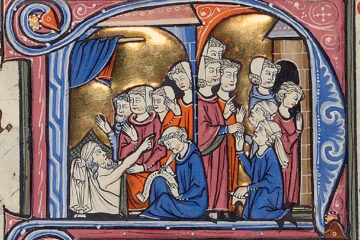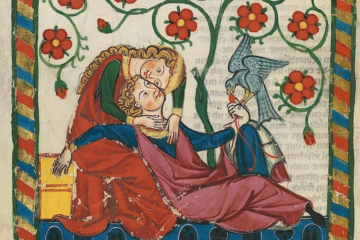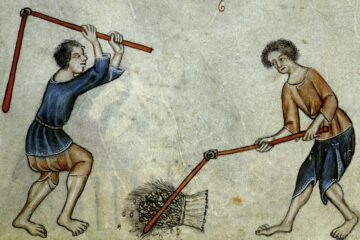Following the Papal Wars, the Western See had been fractured between Rome and Rosewood. Like the Irish, the French resist Rome’s influence over their dioceses.
The Archbishop of Rosewood is the figurehead of this resistance movement against absolute papal supremacy in Europe. Ireland and the Low Countries have joined the French Bishops in protest and have begun to stray from Roman Dogma. Pope Urban II was too slow in denouncing these movements within the West, and that has led to a noticeable rise in heresies.
Where Pope Urban II lacked, Pope Alexander IV made up for with fire and steel.
Regnum Defensionem
Defense of the Kingdom, dated 1199, bearing the Papal Bull, written originally in Latin by Pope Alexander IV.
In Nomine Patris et Filii et Spiritus Sancti,
I, Bishop of Rome, Patriarch of the West, his Holiness, Pope Alexander IV do hereby announce the formation of the French Inquisition. Its structure is subject only to Papal authority and its mission is the extermination of all heretics and false converts. They will be stationed near the Cathedral and will operate from there.
The Inquisitor General will be given full authority to extract confessions from the citizens of Rosewood and will answer only to Rome. If at any time, a freeman is found to be practicing heretical teachings, worshiping pagan gods, posing as a false convert to Christianity, or if they are breaking the scriptures, then they are to be given over to the Inquisition for interrogation.
If a confession is extracted, then the confessor is converted and fined. If they continue with their heretical ways, then they are to be put to death by burning or by hanging.
The Inquisition has the right to confiscate all heretic literature and items of worship and have the obligation to destroy them.
Inquisitors are instructed to convert both Jews and Muslims to the righteous faith, although the threat of capital punishment is to be avoided in their case, unlike the pagan and the heretic.
The Papal Bull of 1199 gave birth and legitimacy to the French Inquisition which began to operate only a year later. Since then, they have remained a thing of horror for the people of Rosewood. Many are given summons by the Inquisition, who require proof of faith or a confession. Either way, few cross their path without suffering their wrath.
Rosewood, and France by extent, would oppose the Papal Bull indirectly by publishing a Decree:
In Nomine Patris et Filii et Spiritus Sancti,
Archbishop’s Decree, dated 1200, bearing the Archbishop’s Seal, written originally in Common by Archbishop Baudoin II of Rosewood.
It is with the good Lord’s virtues that I write this, Baudouin II, Archbishop of Rosewood, the most senior of all my ecclesiastical brethren. Rome’s interference in the affairs of the religious of Rosewood has not gone unnoticed, and while the French See recognized the Pope’s infallibility, I still write this decree in the hopes of promoting the virtues of Rosewood, which follow the virtues of Jesus Christ.
The Inquisition’s mandate, therefore, must be limited to secular laws, and not canon ones. Its liberties must be curbed in the best interests of the Christians of Rosewood. Let us remember the Inquisition that existed during the XI and XII centuries, with Grand Inquisitors like Athelstan, Olivia, Dionora, and Pedro all making great strides in cleansing the City of heresy, but at the same time spilling rivers of innocent Christian blood.
While the Papacy is an instrument of God’s will, the Inquisition is not, and cannot be held to the same standard. As an earthly institution, it must be limited in its ability to harm those undeserving.
The Archbishopric of Rosewood will force upon the Inquisition, a system of the following manner:
-If a freeman is accused of heresy or paganism, they are to be arrested and handed over to the Inquisition.
-The Inquisition has the right to extract a confession from the freeman.
-Upon the confession, they are to be converted and released.
-If they are arrested again for the same offense, then they are to be hanged or burned, and their kin is to be investigated as well.
The two important divergences in approach are the following:
1. The Inquisition cannot act upon instinct or rumor. A witness, informant, is required to cast suspicion upon an individual. If a person has come forward to confess someone’s heresy, then the accused is to be investigated further, possibly requiring a confession.
The Inquisition can issue a summon to the suspect, which they must answer within two day’s time, or be labeled a heretic. Once the two days pass, the Inquisition may enter the person’s home and arrest them.
2. The religious sovereignty of Jewish and Muslim citizens and merchants is to be respected, in accordance with Rosewood’s secular laws. It is only when those same Jews or Muslims are helping to undermine either Rosewood or the Church, that the Inquisition may interfere. Contrary, no Jew or Muslim is to be arrested by the Inquisition, as the Archbishopric recognizes their mission in Rosewood as: “The Cleansing of Heresy and Paganism from Rosewood.” Within that definition, of course, one can count both Jews and Muslims, even Christians, that have engaged in violations of canon laws set by the ecclesiastical councils.
It was then that the Royal Court issued the final and deciding Inquisitorial Charter outlining the mission, liberties, and limitations of the French Inquisition.
In Nomine Patris et Filii et Spiritus Sancti,
We, Lord Charles, second of our name, of the Royal House Sirius, King of France by the good grace of our Lord God, do hereby issue the Inquisitorial Charter of France, within which will be laid out the duties, liberties, and limitations of the Inquisitors, granted, sanctioned and enforced by the Royal Crown of the Kingdom of France.
Dated 1200, bearing the Royal Sirius Seal. Written originally in Common by King Charles II Sirius, outlining the Inquisitorial Charter where he established and empowered the French Inquisition.
We recognize the mission of the Inquisition to be “The purge of heresy, apostasy, and paganism from the City of Rosewood and all settlements under the Crown of France.
We recognize the Inquisition’s right to hold the citizens of France under arrest, if they have been accused of heresy, apostasy, or paganism by at least two witnesses, or if there is undeniable proof of their wrongdoings. The Inquisition is given the right to offer those accused to confess and turn them into a Confessor. Upon confessing, however, the accused is to be converted to be regarded as absolved and be given their freedom back. If they are to be arrested again under the same or similar charges, then they are to be tried.
The Inquisition must recognize its inability to barge into homes and arrest those it suspects. Instead, the Inquisition must issue a formal summons to the accused which will last for two days. If the accused does not turn themselves in, then the Inquisition is within its right to arrest them. The Inquisition cannot arrest a member of the nobility of any charge without the express permission of the King or Archbishop. The Inquisition is not allowed to prosecute criminals who have broken secular laws, although they can lend their help in the investigation or trial.


